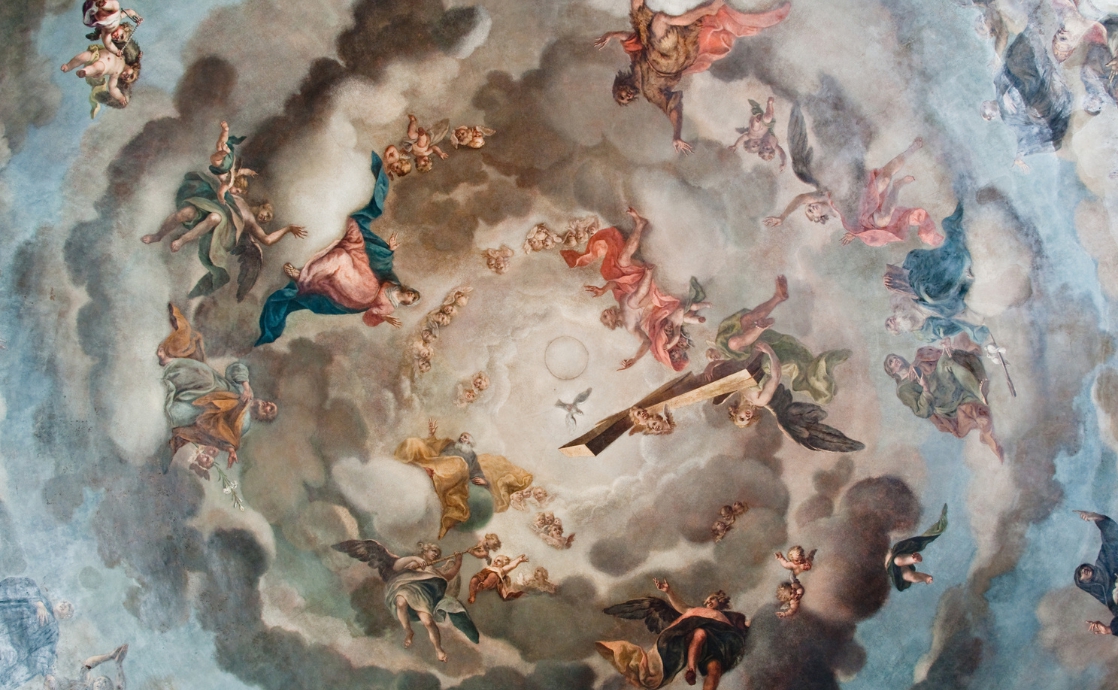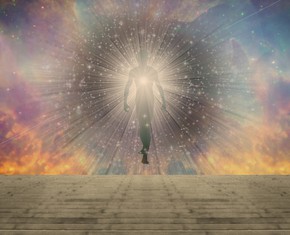The views expressed in our content reflect individual perspectives and do not represent the authoritative views of the Baha'i Faith.
You’ve heard the expression “I’m in seventh heaven,” right? It originally comes from the concept of the seven heavens in Jewish, Christian, and Islamic doctrine – but strangely, it’s a TV show, too.
When you think about seven heavens what comes to mind? Perhaps you remember the highly-acclaimed and longest-running family television series on The WB (and later the CW). It was called 7th Heaven, and told the stories of a Protestant minster, his wife Annie, and their seven children. The series was known for promoting honesty, strong families, respect for one’s parents, and the benefits of a good education.
So what are the seven heavens, as described by the Abrahamic religions? These heavens refer to divisions of existence, each one higher than the last, but are these layers physical places or spiritual conditions?
RELATED: The Hidden Nature of Life After Death
Starting with Judaism, and derived from the Talmud, those scriptures suggest that part of the universe is composed of seven heavenly realms. According to Rabbi Dr. Hillel ben David, those seven realms are:
- Wilon (the closest realm to earth),
- Rakia (the place that fastens the planets),
- Shehaqim (the site for the production of manna, the holy food of angels),
- Zebul (the spot containing the heavenly Jerusalem, the Temple and the Altar),
- Ma’on (the residence of lower-tier angels and Song-Uttering Choir),
- Makon (the originator of most of the trials and visitations ordained for the earth and its inhabitants), and
- Araboth (the Supreme place of Right, Judgment, Righteousness and the throne of God).
In the New Testament, there isn’t an explicit reference to seven heavens, but in the Second Epistle to the Corinthians 12:2, the apostle Paul made reference to the “third heaven,” seemingly suggesting that while on Earth, his spirit was “caught up” in that third heaven. It appears that Paul described a spiritual condition rather than a physical place. Also, in Hebrews 7:26, Christ is deemed to be “exalted above the heavens.” In Biblical terms, the term “the heavens” doesn’t refer to the sky, but instead to the concept of those seven heavens.
Saint Irenaeus of Lyons, a second century Christian bishop, wrote that “this world is encompassed by seven heavens, in which dwell powers and angels and archangels, doing service to God, the Almighty and Maker of all things.” However, he also connected the seven heavens with Isaiah’s seven gifts of the spirit. The number seven has thus become a theme in Christian devotional literature, including the seven virtues, the seven “deadly sins,” and the seven “gifts of the spirit” from Chapter 11 of the Book of Isaiah, which are:
- Wisdom,
- Understanding,
- Counsel,
- Fortitude,
- Knowledge,
- Piety, and
- Fear of the Lord.
In Islam, the seven heavens have various interpretations. According to the Islamic Information Center Worldwide, the seven heavens are:
- Maqoomul Amin (riotousness and piety),
- Darul Muqamah (thanksgiving for all things),
- Darussalam (strong in faith),
- Ma’wa (fear of God),
- Na’im (good deeds of the faithful),
- ‘Adn (patiently seeking the blessing of the Lord), and
- Firdaus (highest level reserved for those who keep God’s laws).
RELATED: How Can I Find the Kingdom of Heaven on Earth?
In the Baha’i writings a few passages mention seven heavens, always in a symbolic sense. Baha’u’llah wrote:
Were it not for the protection of God, the seven heavens would at that moment have been cleft asunder, and the earth would have swallowed up all that dwell upon it, and every lofty peak would have been reduced to dust.
Similarly, in his book The Secret of Divine Civilization, Abdu’l-Baha wrote: “The seven heavens and the seven earths weep over the mighty when he is brought low.”
In God Passes By, Shoghi Effendi, the Guardian of the Baha’i Faith, references Muhammad’s travel through the Holy Land as part of the journey through seven heavens to arrive at the throne of God:
… the Holy Land – the Land promised by God to Abraham, sanctified by the Revelation of Moses, honoured by the lives and labours of the Hebrew patriarchs, judges, kings, and prophets, revered as the cradle of Christianity, and as the place where Zoroaster, according to Abdu’l-Baha’s testimony, had “held converse with some of the prophets of Israel,” and associated by Islam with the Apostle’s night-journey, through the seven heavens, to the throne of the Almighty.
For Baha’is, heaven is more akin to a state of being or condition than any place or physical space. In a tablet, Abdu’l-Baha wrote: “By ‘Heaven’ is not meant this infinite phenomenal space, but ‘heaven’ signifies the world of the divine kingdom which is the supreme station and seat of the Sun of Truth.”
In fact, Baha’is believe, as Shoghi Effendi said, that “Heaven and hell are conditions within our own beings.”
In his writings, Baha’u’llah described the worlds of God as “… countless in their number, and infinite in their range.” However, Baha’u’llah did describe seven stages and conditions on the seeker’s mystical path in his work titled The Seven Valleys, his response to the traditional seven-stage Sufi mystical journey:
- Valley of Search (cleansing the heart),
- Valley of Love (burning away self),
- Valley of Knowledge (contemplating the mysteries of God’s revelation),
- Valley of Unity (seeing the attributes of God in all),
- Valley of Contentment (independence from all things),
- Valley of Wonderment (astonishment by the beauty of God), and
- Valley of True Poverty and Absolute Nothingness (furthermost state that can be reached).
These stages or steps, Baha’u’llah also pointed out in The Seven Valleys, can be traversed “in a single breath:”
These journeys have no visible ending in this temporal world, but the detached wayfarer – should invisible confirmation descend upon him and the Guardian of the Cause assist him – may traverse these seven stages in seven steps, nay rather in seven breaths, nay even in a single breath, should God will and desire it.
All of these seven-fold spiritual schematics point the way toward attaining the most developed, ego-free, and exalted state of spiritual development. They all ask us to grow and mature through a progression of realities that work towards the purification of our lives, and ultimately our souls, so that our being reflects the light of the Creator.
















Comments
Sign in or create an account
Continue with Googleor